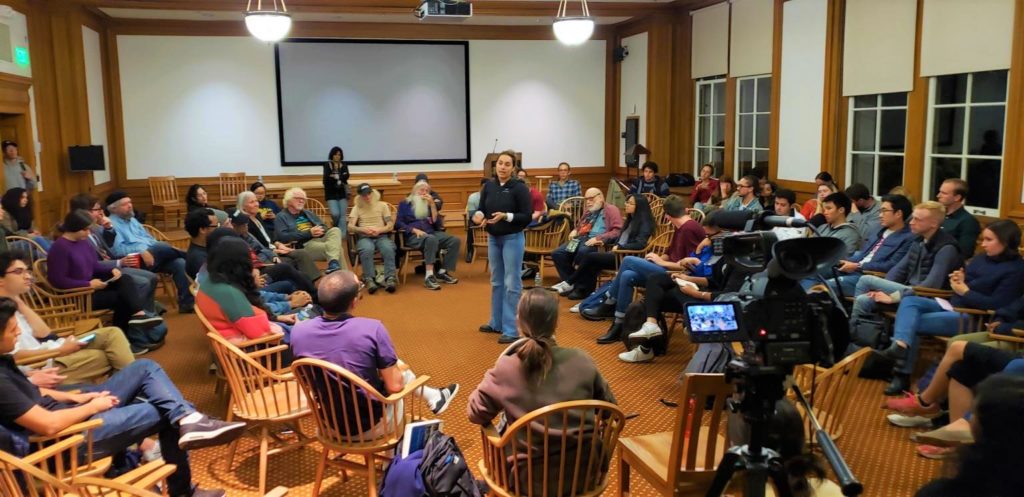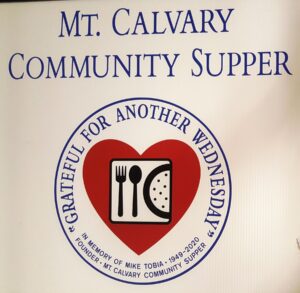The University of California, Berkeley, holds a distinct place in the history of political discussion in America. In fact, it’s practically synonymous with left-wing campus protests.
In the midst of great national division over the Vietnam War, it was in fact a local land dispute—which spurred the crowd-powered creation of People’s Park on university land—that really vaulted the school to its place of prominence in the annals of liberal activism and protest.
Fifty years ago, in mid-1969, the park had been built by activists looking for a place that could give unfettered voice to their free-speech advocacy, which had centered around the civil rights and anti-Vietnam War movements. In the wake of the violent conflict between police and protesters that occurred there—during which one civilian was killed and several people were injured—the park became a long-standing symbol of Berkeley’s activist streak.
In the intervening decades, the conversation around free speech, particularly on college campuses, has continued unabated, and Berkeley remains an epicenter of the debate. But recently the conflict has shifted somewhat, with some on the left emphasizing the limits of free speech rights based on the notion that speech can actually be a form of violence, doing harm to vulnerable people.
And in 2017, the Berkeley campus was convulsed with a series of confrontations between right-wing and left-wing activists, particularly around planned speeches by prominent Trump supporters. The more extreme demonstrators on both sides reverted to violence, and the resulting chaos enabled both camps to criticize each other over bad faith, incivility, and violence in the contentious aftermath of the incidents.
This was the context that faced organizers of a campus debate over the university’s latest plans for People’s Park last month. The event was the result of a collaboration between Braver Angels and various college-focused organizations, including the American Council of Trustees and Alumni (ACTA) and BridgeUSA.
Braver Angels and ACTA had already been working together to foster debates on campuses around the country, and they cultivated a relationship with BridgeUSA because of that group’s strong presence at places like Berkeley.
April Lawson, Braver Angels’ director of debates, knew that campus would be a perfect testing ground for an expansion of the organization’s college debate series.
“If we could do a Braver Angels Debate at Berkeley we could do it anywhere,” she said. Berkeley isn’t exactly known for ideological balance, and with that principle being so core to the organization’s existence, finding a way to hold to it at a strongly left-leaning school with such a high profile could propel Braver Angels’ debate programming on other campuses.
So BridgeUSA’s national leadership put her and Doug Sprei, ACTA’s campus partnership director, in touch with Isaac Huang, president of the organization’s Berkeley chapter.
“We basically wanted to do something that was both relevant to the national conversation of politics, but also more localized,” said Huang. BridgeUSA has been trying to find issues that are highly engaging, issues laden with just enough passionate feeling that they are challenging to broach, which has led to better attendance and participation at events.
“You can always talk about big things like immigration policy or…homelessness in California, which is obviously a huge crisis really, but sometimes it’s hard to just abstractly talk about these things.” The People’s Park issue, on the other hand, occupied the nexus between these larger questions and local, Berkeley-specific issues. And having a partner like Braver Angels, which designs discussion formats that allow passionate people to have productive exchanges, was a boost to BridgeUSA’s ambitions.
Braver Angels started holding debates earlier this year, and Lawson brought her considerable experience to bear in crafting the format.
“This is something I learned in college, so I’ve done pretty much every kind of debate you can think of, including competitive debates,” she said. “At Yale I found a kind of debate that I feel like was both the most powerful intellectual formation I’ve ever had, and in the best community I’ve ever seen, and the combination of those two things just has always really compelled and shaped me.” The result was the Braver Angels Debate.
Lawson used the Yale format as her basis, but among the tweaks she made was a simple rule: everyone in the room is involved. If a film crew is taping, and their cameraman has something to say, why deprive the room of a potentially singular viewpoint?
“It’s pretty important to the spirit of what we’re doing, so I’d be hard pressed to give that up.”
For the Berkeley debate, of course, that meant that those who had been on either side of recent clashes might be there. But the organizers were confident enough in Braver Angels’ robust debate format that they felt it would be a productive event for the community. The resolution under discussion: UC Berkeley should not build housing on People’s Park.
And there would be plenty of passion aroused by this issue. The organizers learned before the event that there would be a rally nearby in the hours just before the debate, in support of preserving the park in its current form, without housing.
The person organizing this rally was Aidan Hill, an activist with a history of challenging authority, and a member of the People’s Park Committee, who prefers to be addressed by they/them pronouns. While Hill says that the rally’s timing and location were coincidental, they did reach out to the debate organizers to express interest in attending the debate. It could be a way, they suggested, for students and for some of the significant number of homeless people who live in the park to have a serious conversation about land use concerns regarding the university’s plan to build housing there.
Before Sprei received that message, the organizers weren’t familiar with Hill. But a quick search of the activist’s name revealed that they had been involved in confrontations and even arrested for disrupting a class, leading the organizers to wonder about Hill’s motivation.
“There was this kind of cloud of uncertainty about what will happen,” Sprei said, “and how can we manage this, and will the debate kind of implode before we even get started.”
But the group decided active engagement was the best path, and a call with Hill went very well. The group chose to focus more on the promise of harnessing the passion and energy Hill and their fellow activists would bring, even inviting Hill to be one of the initial speakers at the debate. The organizers also went to the rally to meet Hill and their compatriots, where Hill announced the debate afterward, and brought around 15 people to it.
When Hill got up to speak in favor of preserving the park in its present state, Sprei said, they “hit it out of the park,” presenting their case in a “passionate and thoughtful” way.
Lawson agreed, saying that Hill “gave, in my view, the best speech of the whole event. It was very eloquent and very sharp.” She felt that the organizers’ respectful communication with Hill was the key, emphasizing that they valued their input, rather than treating them like a problem to be managed.
Hill felt positively about the experience, as well.
“The debate was really successful, I think for everyone involved,” they said. “No one was extremely hostile. People were able to speak without being heckled. Overall there was great consensus and people who were on the pro side and the negative side came together and talked openly.”
While Hill was disappointed that a representative of the university administration wasn’t able to attend the debate, they understand the reasons, given the protest methods of the People’s Park Committee in the past.
“The fact that they couldn’t attend, it actually made it a little bit more polarized because now we’re fighting against what we perceive as a machine, an administration that has multiple voices speaking on these issues. If someone came from the administration and gave their personal feelings and reported back that this is what we found, it would be within what we want as a committee, we want that dialogue.”
Sprei said that the organizers reached out to the university only a few days before the debate—which they would do sooner for future events. Although administration officials were unable to attend on short notice, Assistant Vice Chancellor Dan Mogulof sent “a thoughtful letter” which was read at the beginning of the debate to lay out the most current facts about the university’s plan for the park, which helped establish a common baseline of understanding for the debaters.
A few different themes arose throughout the conversation, including enrollment in the school, which the park activists feel is being inflated by the university despite a housing shortage. Students like Huang pushed back on this notion, and cited specific measures that the administration says it’s taking to mitigate the enrollment issue.
Another major fault line was the issue of crime and safety in the park, which most everyone involved sees as a problem. There were even members of the park’s homeless community in attendance, who spoke passionately about how it affected them.
Overall, Hill felt that the event broadened their perspective on some of the issues.
“I’ve heard those arguments before, but haven’t heard the reasoning from a student perspective about those arguments,” they said, “and so that was very important to me. Some of those arguments are very true, like it’s not necessarily safe to walk in the middle of a green space without lighting.”
And Huang emphasized how successful the event was in fostering a deeper dialogue between opposing sides, especially compared to other efforts in that vein. The Democratic and Republican student groups, for example, have held debates together for which “turnout is always abysmal,” he said.
“I think people are…tired of this idea of Democrats and Republicans debating, cause I think it sort of reminds them of the national political stage where it’s not productive. Both sides know exactly what they’re trying to do, and they only dig in their heels further when they arrive.”
As an organization, though, Braver Angels has experienced a distinct trend of conservative engagement around debates. While liberals tend to be more likely to seek out organizations that focus on depolarization, Braver Angels debates are consistently able to draw in participants who skew more red.
This better balance, and the ability to generate excitement around issues that have deep bearing on people’s lives, make Braver Angels Debates a crucial part of the organization’s growth plans. ACTA is a key partner in that, and Lawson and Sprei plan to continue to engage with the more than a dozen active BridgeUSA chapters around the country.
The Braver Angels Debate program continues to expand to more schools, like Christopher Newport University in Virginia, which held its own discussion around gun policy two weeks after the Berkeley debate. Topics like that tend to fall more directly along partisan lines, and according to Lawson can be used to engage participants from rural areas.
Regardless of the topic, though, Braver Angels Debates are valued by attendees who want to refine their own arguments, and even to get a more nuanced understanding of their own beliefs—and for that, nothing’s quite as helpful as a strong counterpoint.
“I did enjoy the quality of the opposition’s argument. I didn’t think that an effective and meaningful discussion could take place if both sides don’t come prepared with their strongest arguments,” said Berkeley participant Anthony George. “So I’m grateful for the opposition. Really. I’m grateful how sharp they are.”
Sprei agreed, adding that the debate format naturally brings out the best in everyone there.
“As the debate progressed, from the opening speeches throughout the evening, you could really feel people setting in and listening to each other on the edge of their chair, you know that heightened quality of listening and attention…that’s riveting,” he said. “And that’s what helps people who have a very strong opinion about something listen to somebody else whose opinion is equally strong but opposing.
“A lot of us felt that the atmosphere of empathy and listening in the room just went up and up, and that’s just the thing that keeps me coming back to these debates, why I believe in them so strongly. They’re transformative.”





2 thoughts on “Dispatch on a Debate at UC Berkeley”
Could you say more about how the debate was structured?
It was run as the rest of our debates are, with alternating pro/con speeches, each followed by a question period for the speaker. The speeches start at 4 minutes and move to 3 and 2 minutes later, and time-tested parliamentary procedure is used (addressing the chair instead of the speaker) to keep the atmosphere more civil and productive.